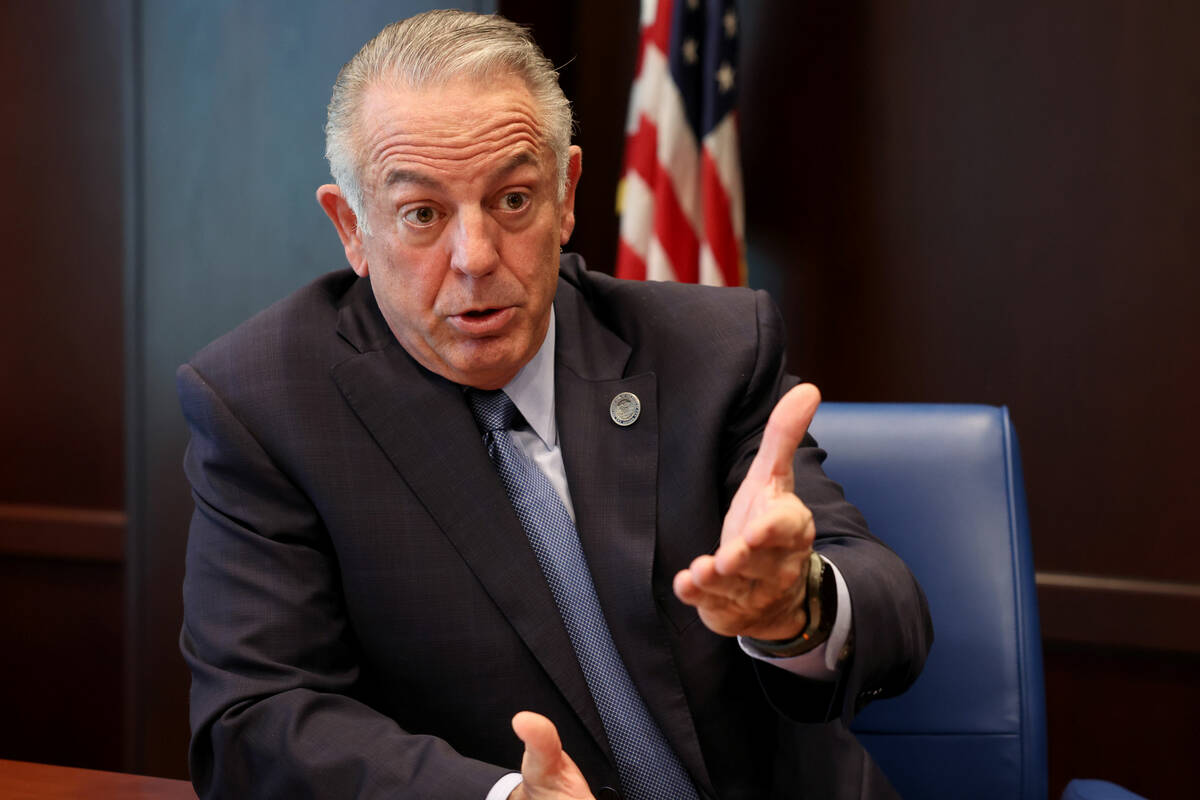Nevada officially has a state drink, thanks to new law
Nevada now has an official state drink. Say hello to the “picon punch,” a cocktail that gives a nod to Nevada’s rich Basque history.
Gov. Joe Lombardo recently signed the bill into law, adding to the growing list of new laws coming out of the legislative session.
The Nevada Legislature wrapped up its 83rd session early on June 3, and the governor has been making his way through the stack, either signing them or vetoing them. As of Thursday afternoon, Lombardo had signed over 500 bills.
Here’s a running list of some notable bills signed by the governor. The list will continue to be updated as more bills are signed, with the latest at the top.
Picon Punch and cocktails-to-go
Assembly Bill 375 allows restaurants to sell cocktails-to-go, an originally pandemic era policy, and establishes the “Picon Punch” as the official state drink of Nevada. Picon Punch is a bittersweet and aromatic cocktail created by Basque immigrants in the American West.
The bill, sponsored by Democratic Speaker Steve Yeager and Republican Assemblymember Bert Gurr, passed the Assembly 41-1 and the Senate 20-1, with Republican Assemblymember Heidi Kasama and Democratic Sen. Marilyn Dondero Loop as the lone ‘no’ votes.
Major bipartisan education reform
Senate Bill 460 is the sweeping education reform bill that meshes a bill sponsored by Democratic Senate Majority Leader Nicole Cannizzaro and incorporating Lombardo’s own education proposals. The new law aims to improve accountability of school districts, provide expanded pre-kindergarten programs and open enrollment, and increase teacher recruitment.
The legislation was an effort of compromise between Cannizzaro and Lombardo, who originally introduced his own education reform bill. Near the end of the session, they worked to merge parts of Lombardo’s bill with Cannizzaro’s. The bill passed the Assembly 38-4 and the Senate 21-0.
Changing the definition of antisemitism
Senate Bill 179, sponsored by Democratic Sen. James Ohrenschall, defines the term antisemitism for the Nevada Equal Rights Commission’s investigations into discrimination in housing, employment and accommodations. The bill includes the widely recognized definition made by the International Holocaust Remembrance Alliance, which includes contemporary examples of antisemitic acts.
It passed the Assembly 28-4 — with 10 legislators excused — and the Senate 20-1, with Republican Sen. Ira Hansen as the lone ‘no’ vote.
Penalties against AI-generated child pornography
SB 263, sponsored by Senate Majority Leader Nicole Cannizzaro and others, expands the definition of child pornography to include sexually explicit computer generated images of actual minors or images where the person is indistinguishable from a minor. A person found guilty of a second or subsequent violation is guilty of a category A felony, which is punishable by between 10 years and a life sentence in prison.
It passed the Assembly 35-4 and the Senate 20-0.
Expanding access to rooftop solar
Assembly Bill 458, sponsored by Assemblymember Howard Watts, expands access to rooftop solar for families in affordable housing. Many lower-income renters couldn’t participate in Nevada’s solar cost savings, and his legislation brings cost saving benefits to those renters, Watts said in a statement.
The legislation passed the Assembly 36-6 and the Senate 13-7, and it takes effect immediately.
Requiring Medicaid to provide coverage to the homeless
SB 54, sponsored by the Senate Committee on Health and Human Services, requires Medicaid to provide coverage for medical respite care to people experiencing homelessness if federal funding is available. Medical care includes behavioral health services, food and housing services, medication storage and management, transportation to medical appointments and acute and post-acute medical care.
The bill passed both chambers unanimously, with a few excused absences, including Democratic Assemblymembers Natha Anderson, Shea Backus and Cecelia González.
Right to Contraception and Family Planning Services Act
Sponsored by Assemblymember Selena Torres-Fossett, AB 176 prohibits a governmental entity from implementing limitations or requirements that single out contraception and family planning services and burdens a person’s access to contraception and family planning services.
The bill passed both chambers unanimously.
Sample ballots before mail ballots
AB 148, which passed both chambers unanimously, ensures sample ballots are mailed before the official mail ballots ahead of an election.
Sponsored by both Democratic Speaker Steve Yeager of Las Vegas and Republican Assemblymember Gregory Hafen II of Pahrump, AB 148 requires city and county clerks to mail the sample ballots before the official ballot by changing the mail and sample ballot deadlines.
Public records task force
AB 128, which passed both houses unanimously, will create a task force to evaluate topics relating to public records requests. The bill originally sought to create a public records ombudsman to handle public records disputes, which open-government experts warned could be problematic, but it was amended to a task force.
The task force must evaluate exemptions to the public records law, the costs and burdens of a governmental entity to redact records and mechanisms to resolve disputes about records, among other topics.
Preventing dog breed bans in rental properties
SB 166 prevents insurers from refusing to issue or cancel a policy because the residence has a specific dog breed or dog breed mix for rental properties. Sponsored by Sen. Melanie Scheible, D-Las Vegas, the bill expands on an existing law passed in 2021 to multi-family properties. It also allows residents of supportive housing to keep at least one pet. The law becomes effective Oct. 1.
Lactation education and rights
AB 266, sponsored by Las Vegas Democrat Cecelia Gonzalez, requires the Department of Health and Human Services to publish information about lactation support that is available through Medicaid, along with a list of those support services available in the community. It also requires the department to conduct a public education campaign about lactation.
The new law also allows people to file complaints with the Nevada Equal Rights Commission if someone believes they have been denied public accommodations because the person is breastfeeding a child — though it would not be discrimination to enforce laws that prevent minors in certain areas.
Medicaid coverage for NICU babies
SB 138, sponsored by Senate Majority Leader Nicole Cannizzaro, requires birthing hospitals to offer parents to enroll their babies in presumptive eligibility for Medicaid to ensure coverage for neonatal intensive care.
The bill passed the Assembly 37-5, with Republicans Jill Dickman, Danielle Gallant, Bert Gurr, Gregory Hafen and PK O’Neill against it. It passed the Senate 18-3, with Republican Sens. Carrie Buck, Lisa Krasner and Robin Titus opposed.
Housing development on commercial zoning
AB 241, sponsored by Assemblymember Sandra Jauregui, requires county and city governing bodies to adopt an ordinance to allow someone to apply for a permit to build housing on property zoned for commercial use.
The bill passed the Assembly 28-14 and the Senate 15-6. Republicans Danielle Gallant, Lori Rogich and John Steinbeck crossed party lines and voted in favor.
Governing bodies must adopt the ordinance by March 2026.
Targeting phony ‘ghost kitchens’ on delivery apps
Fake restaurants on food delivery apps may be rooted out through AB 116.
The new law requires food delivery apps only to work with businesses with proper permits from their local health authority.
Supporters of the measure – including James Trees, the chef and owner of Esther’s Kitchen in the Art’s District — said it will help address phony delivery-only restaurant operations through penalties against the app or platform. The law says platforms who receive “specific, verifiable information” about restaurant users that do not have the proper health permits or provided the platform with false or misleading information about their permits must remove the user no more than 10 days later. If they do not, they are subject to a $500 civil penalty.
The law becomes effective on Jan. 1, 2026.
Wrong-way driving now a misdemeanor
Assembly Bill 111, known as Jaya’s Law, will make wrong-way driving on a divided highway a misdemeanor rather than a civil infraction, aiming to curb the large number of roadway fatalities that occur every year. The bill is named after a girl who was killed in a wrong-way crash on a Las Vegas highway in 2023.
The bill’s sponsor, Assemblymember Brian Hibbetts, R-Las Vegas, said he had no doubt the governor would sign it. He was happy to get it passed through both houses unanimously and with zero amendments.
“I hope it’ll get people talking about the issue, and also thinking more when they’re driving, taking their head out of their phone or out of their stereo or whatever it is that’s distracting them, and pay attention to what they’re doing while they’re driving around in a 3,000 pound weapon,” Hibbetts said in an interview Sunday.
Database for victims of mass casualty
AB 50 aims to improve the reunification of victims of a mass casualty event and provide them with long-term support.
The idea stemmed from Clark County first responders who created a database after the Oct. 1, 2017 mass shooting in Las Vegas to better track victims and reunite them with their families.
AB 50 requires hospitals to report into the database and inquire whether victims want to receive long-term support services.
Regional rail transit studies
Is a trip from Las Vegas to Reno by train possible in the future? The Legislature hopes to find out.
AB 256 directs the Legislative Commission to appoint a Regional Rail Transit Advisory Working Group to conduct an interim study relating to regional rail transit. The group will study the current state of regional rail transit and public and private entities that should be involved in development of rail transit.
They’ll have to submit an actionable plan for the development of regional rail transit in communities across the state.
The bill’s passage is the first of many steps the Legislature will have to take in a long-term project to bring regional rail transit to the state, according to Assemblymember Selena La Rue Hatch, one of the bill’s sponsors.
Live event ticket price transparency
Both houses of the Legislature unanimously approved Senate Bill 338, requiring businesses that sell live-event tickets to “clearly and conspicuously” display the maximum total price to the buyer before the transaction. Sellers can exclude governmental charges, shipping charges, and fees and charges for add-ons from the total price displayed.
SB 338 also includes requirements to include transparent refund policies from ticket providers and adds civil penalties.
The law codifies into Nevada’s statute a Federal Trade Commission rule announced in January, which took effect May 12. Nevada’s law becomes effective Oct. 1.
School phone use policies
Boards of trustees for school districts already have a policy on student phone use and possession on school property, but SB 444 requires the policy to include measures for disciplining students on a progressive scale based on the number of times a student uses a phone or other communication device.
The policy must also include placing certain limits on the use of electronic communication devices during class, including tablets and phones. Policies must be adopted no later than June 30, 2026.
This is a developing story. Check back for updates.
Contact Jessica Hill at jehill@reviewjournal.com and McKenna Ross at mross@reviewjournal.com. Follow @jess_hillyeah and @mckenna_ross_ on X.


















